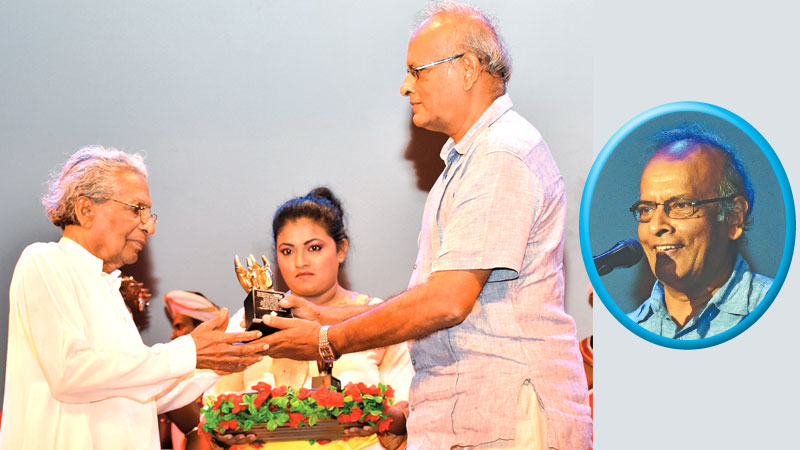Senior playwright and brainchild of ‘Janakaraliya aka Makkal Kalari, Parakrama Niriella marked a significant chapter in his life this February. His masterpiece stage drama Sekkuwa celebrating its 40th birth anniversary and Janakaraliya’s dignified completion of 15 years coincided with a felicitation to the maestro done in India.
Rangayana Drama and Theatre Institute at the ‘Bahuroopi International Theatre Festival 2017’ in Mysore, India felicitated Parakrama Niriella for the contribution made by him via Janakaraliya towards nurturing human relationships.
The Sri Lankan mobile theatre Janakaraliya is a multi-ethnic platform to share values, customs, traditions and cultures via drama, irrespective of one's religion, race, language or caste.
An event held at the University of Visual and Performing Arts in Colombo subsequently to these multiple celebrations felicitated three sets of artistes contributed to Sekkuwa since 1976. A bonus for the audience was the opportunity to witness the newest version of Sekkuwa drama staged by Janakaraliya team.
Prior to staging Sekkuwa, literature and drama critic Sugath Watagedera and veteran journalist Kusal Perera made speeches. Sugath Watagedera said 1976 version of Sekkuwa was special because it shed light on political developments in the 1970s.
“Gunadasa Amarasekera called the string of political dramas made in 1970s ‘Papadam Dramas’ but Sekkuwa didn’t belong to this category. Marxist ideologies were at its best in this era.
 Niriella’s Sekkuwa made emphasis on a machine used in the Colonial era called Sekkuwa or Oil Press. It is a manual machine used to extract oil from Copra. It made the operator rotate at one place without moving further. In the drama, Rala was the underprivileged folk who operate Sekkuwa while the owner of Sekkuwa, Mahathena or ‘Lord’ was the rich man. The Lord takes loans from a rich country depicted as ‘Otherworld’ in the drama.
Niriella’s Sekkuwa made emphasis on a machine used in the Colonial era called Sekkuwa or Oil Press. It is a manual machine used to extract oil from Copra. It made the operator rotate at one place without moving further. In the drama, Rala was the underprivileged folk who operate Sekkuwa while the owner of Sekkuwa, Mahathena or ‘Lord’ was the rich man. The Lord takes loans from a rich country depicted as ‘Otherworld’ in the drama.
Sekkuwa communicated the message; After winning independence in 1948 we still rotate at one place while making a particular segment in the society to enjoy all luxuries in life. Even today our country is stuck with foreign loans and the similar situation prevails”, said Watagedera.
He added, “Sekkuwa drama is made according to ‘Sokari’ style and folklore is used to enrich the story.
Prof Sarachchandra made Maname based on Nadagam style. Niriella used Sokari and Kolam styles to make Sekkuwa. Further he blended the drama with attributes of ‘Street Drama’ style championed by late Gamini Haththotuwegama.
Sekkuwa thus was made to be shown in ‘New Arena’ style theatres where spectators could see it from four sides. Parakrama’s dramas; Sekkuwa, Charandas, Meti Karaththaya are made to be shown like this.
Niriella eventually ventured the television and cinema spheres and did noteworthy contributions to those spheres”, said Watagedera.
Veteran journalist Kusal Perera said Sekkuwa drama brought to fore a clear political discussion via a common villager projected as ‘Rala’ craving for a ‘Sarubima’ or Greener Pastures.
“Leftist ideology carried a significant influence to local Art sphere in the 70 decade thus artistes couldn’t keep a blind eye to this scenario. R R Samarakone's ‘Idama’, Sugathapala Silva’s ‘Dunna Dunugamuwe’ and Niriella’s ‘Sekkuwa’ were dramas made in this context that sent vibes within the society. These dramas carried leftist ideology but they were made for the masses to watch and enjoy.
However those days Nationalistic ideas always revolved around Sinhala community thus other communities were sidelined. Even Rala in Sekkuwa projects hardships experienced by an underprivileged Sinhala community.
By 1978 Sri Lanka embraced an Open economic system. After 1978 a globalised economic system was adapted by many countries in the world including our country. After a decade’s time, Socialist system came to an end in the world thus Rala’s craving for greener pastures with leftist ideology in Sekkuwa was challenged”, said Perera.
He continued, “When I watched Sekkuwa in 2010, I saw a difference in the drama. Parakrama with Janakaraliya team by this time had added a new part to the drama. They brought Rala to the present glittering context. Rala’s attire now was different and he associated with a different society.
Market economy prevailing in the present context is based on consumption and makes emphasis on development. It doesn’t make room for people to have a cultural life. We in this context do not have freedom and leisure to associate with culture or Art like earlier. Today we are on a rat-race. Reality shows on TV provide and instant enjoyment to reduce stress. In an economy that caters to fulfil consumers’ needs and wants with products and services, Parakrama Niriella still goes places with his Janakaraliya team. His efforts are being commended from quarters here and abroad that identify the value in them”, concluded Kusal Perera.



Add new comment